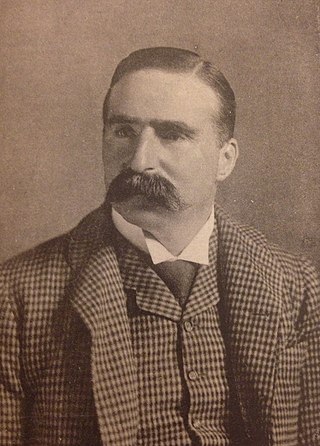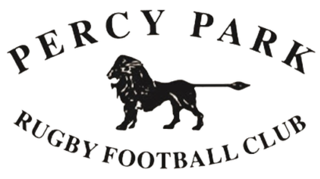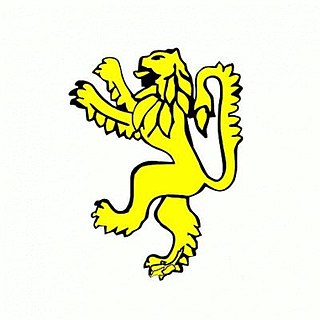
The Rugby Football Union (RFU) is the national governing body for rugby union in England. It was founded in 1871, and was the sport's international governing body prior to the formation of what is now known as World Rugby (WR) in 1886. It promotes and runs the sport, organises international matches for the England national team, and educates and trains players and officials.

Sir William Blackledge Beaumont is a former rugby union player, and was captain of the England rugby union team, earning 34 caps. His greatest moment as captain was the unexpected 1980 Grand Slam win. He played as a lock.

The Army Rugby Union (ARU) is the governing body for rugby union in the British Army and a constituent body of the Rugby Football Union (RFU). The ARU was formed on 31 December 1906 and marked the fulfilment of Lieutenant J. E. C. "Birdie" Partridge's idea to have a body to administer the playing of rugby union in the British Army.

The 1888–89 New Zealand Native football team was a New Zealand rugby union team that toured Britain, Ireland, Australia and New Zealand in 1888 and 1889. It mostly comprised players of Māori ancestry, but also included some Pākehā. A wholly private endeavour, the tour was not under the auspices of any official rugby authority; it was organised by New Zealand international player Joseph Warbrick, promoted by public servant Thomas Eyton, and managed by James Scott, a publican. The Natives were the first New Zealand team to perform a haka, and also the first to wear all black. They played 107 rugby matches during the tour, as well as a small number of Victorian Rules football matches in Australia. Having made a significant impact on the development of New Zealand rugby, the Natives were inducted into the World Rugby Hall of Fame in 2008.
The 1999 Five Nations Championship was the 70th series of the rugby union Five Nations Championship. Including the previous incarnations as the Home Nations and Five Nations, this was the 105th series of the northern hemisphere rugby union championship. Ten matches were played over five weekends from 6 February to 11 April. The tournament was won by Scotland, who beat England on points difference.
The 1924 Five Nations Championship was the tenth series of the rugby union Five Nations Championship following the inclusion of France into the Home Nations Championship. Including the previous Home Nations Championships, this was the thirty-seventh series of the annual northern hemisphere rugby union championship. Ten matches were played between 1 January and 27 March. It was contested by England, France, Ireland, Scotland and Wales.
The 1925 Five Nations Championship was the eleventh series of the rugby union Five Nations Championship following the inclusion of France into the Home Nations Championship. Including the previous Home Nations Championships, this was the thirty-eighth series of the annual northern hemisphere rugby union championship. Ten matches were played between 24 January and 18 April. It was contested by England, France, Ireland, Scotland and Wales.
Donald Rutherford was an England international rugby union player and administrator. He was the first ever Technical Director of the Rugby Football Union at Twickenham, becoming Director of Rugby where he served with distinction from 1969 – 1999.

Colonel Richard Davies Garnons Williams was a British Army officer and Welsh rugby union player who represented Wales, Brecon and Newport. He played in the first Wales international rugby union match in 1881.

The 1899 British Isles tour to Australia was the fourth rugby union tour by a British Isles team and the second to Australia; though the first tour in 1888 was a private venture, making the 1899 tour the first official undertaking of Australia. It is retrospectively classed as one of the British Lions tours, as the Lions naming convention was not adopted until 1950.

Frank Moxon Stout MC also referred to as Frank Moxham Stout, was an English international rugby union forward who played club rugby for Gloucester and Richmond. Stout played international rugby for England and was selected for the British Isles on two tours in 1899 and 1903. On the 1899 tour of Australia, he acted as on field captain for three of the Tests.
Robert William Bell was an English international rugby union forward who played club rugby for Cambridge University and Northern. Bell played international rugby for England.
Stanley Wakefield Harris CBE was an early twentieth century all-round sportsman regarded as one of the greatest all-rounders to have played for the British and Irish Lions. As a rugby union international, he represented England in 1920, and the British Lions in 1924. He also turned down a place in the Great Britain Olympic squad in 1920, became a South African boxing champion and represented England in polo, all in between serving in both the First and Second World Wars.

Samuel Victor Perry FRS was an English biochemist who was a pioneer in the field of muscle biochemistry. In his earlier years he was a rugby union lock who played club rugby for Southport R.F.C., Cambridge University R.U.F.C. and international rugby for England.
John Guy Giberne Birkett was an English international rugby union player who played for England between 1906 and 1912, and also captained the side on more than one occasion. He also has the distinction of scoring the first ever try at Twickenham Stadium, echoing the feat of his father who in 1871, in the first ever international rugby match scored England's first ever try.
George Carmichael "Tot" Robinson (1876–1940) was a rugby union international who represented England from 1897 to 1901. After retiring from playing rugby he became a sports administrator and rugby selector, eventually serving as president for the Rugby Football Union.

Percy Park Rugby Football Club is an English rugby union team based in North Shields, Tyne & Wear. The club runs three senior sides and a full set of junior teams. The first XV currently plays in Regional 1 North East.

Alnwick RFC is an amateur rugby union club based in the town of Alnwick, Northumberland in north-east England. The club play in Regional 1 North East, a level five league in the English rugby union system and are the most northerly rugby union club in English league rugby,. Alnwick regularly field three senior sides, all of which play competitive league and cup rugby. The club also has a junior section running teams from under 7's through to under 18's and a girls section.
John Anthony Sydney Ritson DSO & Bar, was an English mines inspector and engineer who became professor of mining at Leeds University and at the Royal School of Mines, Imperial College, London. In his early life he was a rugby union player of note playing international rugby for both England and the British and Irish Lions, and was a member of the first ever English Grand Slam winning side. During the First World War he served in the Durham Light Infantry and later commanded a battalion of the Royal Scots.
Carston may refer to: